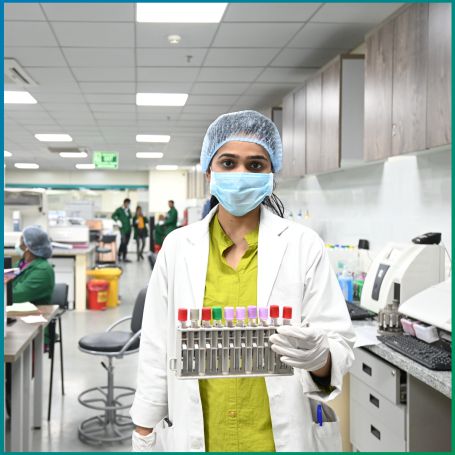
Aspirated fluid refers to any fluid that is removed from the body through a needle or catheter inserted into a specific body cavity or organ.

The C/S Aspirated Fluid Test, also known as the Culture and Sensitivity Test for Aspirated Fluid, is a diagnostic procedure used to analyze fluid that has been aspirated or withdrawn from a body cavity or organ. This test is particularly useful for diagnosing infections, determining the underlying cause of inflammation, and assessing the appropriate treatment options for bacterial or fungal infections. Aspirated fluids can be obtained from various sites in the body, including joints, abscesses, pleural space (lungs), peritoneal cavity (abdomen), or synovial fluid around the joints, and each type of aspirate is analyzed for specific conditions.
1] Preparation: The patient is positioned comfortably, and the area from which the fluid will be aspirated is cleaned and sterilized to reduce the risk of infection. Local anesthesia is often used to numb the area.
2] Aspiration: A sterile needle or catheter is inserted into the body cavity where the fluid is located. The needle or catheter is guided by anatomical landmarks or, in some cases, with ultrasound guidance to ensure precise fluid collection.
3] Fluid Collection: Once the needle reaches the target area, a small amount of fluid is aspirated (drawn out) into sterile containers. Depending on the suspected condition, multiple samples may be collected for different tests.
4] Laboratory Analysis: The collected fluid is sent to a laboratory where it undergoes microbiological analysis. The lab will culture the fluid to identify any microorganisms (bacteria, fungi, etc.) that may be present. They will also conduct antibiotic sensitivity testing to determine which antibiotics are most effective against the identified organisms.
5] Results: The lab results will include details on the type of microorganisms found, their characteristics, and any antibiotic sensitivities. These results help doctors decide the most effective treatment.
1] Positive Culture: If bacteria, fungi, or other pathogens are found, the result indicates an infection. The lab will specify the type of microorganism (e.g., Staphylococcus aureus, Pseudomonas aeruginosa) and conduct antibiotic sensitivity testing to guide treatment.
2] Negative Culture: If no pathogens are identified, it may suggest that the infection is viral, or no infection is present, and the fluid may be analyzed for other causes, such as autoimmune conditions or cancer.
3] Inflammatory Markers: Elevated white blood cells (WBCs) and protein levels in the aspirated fluid may indicate an inflammatory condition or infection.
4] Glucose Levels: Low glucose levels in aspirated fluid can be indicative of infection, while normal glucose levels may point to other causes of fluid accumulation like cancer or inflammation.
Choosing pathology lab test in Pune for your C/S Aspirated Fluid Test ensures that you receive the highest quality diagnostic care with accurate, reliable results. We use state-of-the-art laboratory technology and follow stringent quality standards to ensure precise identification of infections and pathogens in your aspirated fluid. Our expert medical team is committed to providing comprehensive testing and guiding you through every step of the process, from sample collection to understanding your results. With same-day reporting, home sample collection, and affordable pricing, we make the process convenient and accessible. Whether you’re dealing with a joint infection, abdominal condition, or pleural effusion, Diagnopein offers fast, efficient, and personalized service. Trust us to help you diagnose and manage your condition effectively, ensuring timely and targeted treatment for better health outcomes.
1. Culture Method
2. Sample
3. Colony Count
4. Organism(s) Isolated
5. Culture Report: Culture yields growth of
6. Culture isolated after 7 days :
7. Culture isolated after 14 days:
8. Culture isolated after 21 days:
9. Ampicillin
10. Amikacin
11. Amoxicillin clavulanate
12. cefoperazon+sulbactam
13. Cefuroxime
14. Cefepime
15. Cefotaxime
16. Ciprofloxacin
17. Ertapenem
18. Gentamicin
19. Imipenem
20. Meropenem
21. Norfloxacin
22. Nitrofurantoin
23. Piperacillin-tazobactam
24. Trimethoprim-Sulfamethoxazole (Cotrimoxazole)
This test helps diagnose infections, determine the causative microorganisms, and guide the choice of antibiotics or antifungal treatment.
The C/S Aspirated Fluid Test analyzes fluid removed from a body cavity or organ to identify infections and determine the most effective antibiotic treatment.
A sample of aspirated fluid is collected through a needle or catheter inserted into the affected area (e.g., joint, abdomen, or chest), then sent to a lab for analysis.
No special preparation is typically required, but your doctor may provide instructions depending on the area being aspirated and your medical condition.